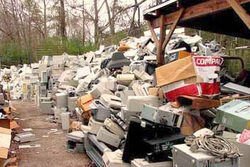
NEW DELHI - The Delhi-National Capital Region (NCR) is fast turning into the world’s e-waste dumping yard with the capital alone getting 86 percent of waste generated in the developed world, a report said. “Delhi-NCR is emerging as the world’s dumping yard for e-waste and is likely to generate to an extent of 95,000 metric tons (MT) per annum by 2017 from the current level of 55,000 metric tons per annum growing...

at a compound annual growth rate (CAGR) of about 25 percent,” The Associated Chambers of Commerce and Industry of India (Assocham) said here Aug 7 citing their latest study. The study further indicates that the US accounts for the bulk of the e-waste imports into the country, followed by China and the European Union. Over 250,000 workers are employed in the various organized and unorganized recycling units in the state, the report noted. Alarmingly, only a small fraction of the total e-waste generated in the country is getting recycled. “Less than 2 percent of India’s total electronic waste gets recycled due to absence of proper infrastructure, legislation and framework,” said D.S. Rawat, secretary general, Assocham.
The country produces approximately 1.3 million metric tons of e-waste per annum. Mumbai generates the highest quantity of e-waste, followed by Delhi-NCR and Bangalore. In addition to the huge e-waste it generates, Delhi-NCR also imports e-waste from other metros like Mumbai. Also, the bulk of e-waste imports from the developed world end up here. Computer equipment accounts for almost 68 percent of e-waste followed by telecommunication equipment (12 percent), electrical equipment (8 percent) and medical equipment (7 percent). Other equipment, including household e-scrap, accounts for the remaining 5 percent, the study said. (IANS)
The country produces approximately 1.3 million metric tons of e-waste per annum. Mumbai generates the highest quantity of e-waste, followed by Delhi-NCR and Bangalore. In addition to the huge e-waste it generates, Delhi-NCR also imports e-waste from other metros like Mumbai. Also, the bulk of e-waste imports from the developed world end up here. Computer equipment accounts for almost 68 percent of e-waste followed by telecommunication equipment (12 percent), electrical equipment (8 percent) and medical equipment (7 percent). Other equipment, including household e-scrap, accounts for the remaining 5 percent, the study said. (IANS)

 RSS Feed
RSS Feed
